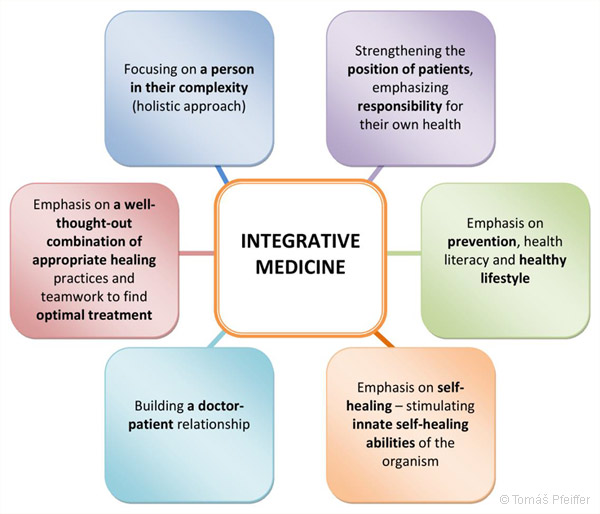Integrative Medicine – a Modern Concept In Health Care
The term Integrative Medicine (IM) refers to a modern approach to patient care that combines conventional medicine with complementary and alternative medicine.
It is not a simple case of adding one method to another but a new concept of health and healthcare. This is in line with the new definition of health (from the 1950s), according to which health is "a state of complete physical, mental and social well-being and not just the absence of disease or illness" (WHO, 1948) (155). Integrative medicine respects the fact that human health is determined by many different factors, including lifestyle and social environment.
IM is mainly characterized by its holistic approach and emphasis on preventive measures and a healthy lifestyle. It stimulates the innate self-healing abilities of the body and rationally combines appropriate treatments in order to find the best option. This mainly involves complementing conventional medicine with non-medical treatment methods.

Statements and documents issued by professional CAM organizations and other CAM advocates employ the term complementary and alternative medicine, abbreviated as CAM (see the previous chapter). The emphasis is put on CAM’s potential, its advantages and benefits in comparison with and in contrast to conventional medicine. All these associations and initiatives strive to see both approaches cooperating organically and rationally. This promotes the concept of integrative medicine, a new approach to patient care which, as is increasingly evident, corresponds to the needs and challenges of the health sector of the 21st century:
“Integrative health and medicine has emerged as a movement that focuses on the whole person, considering the individual in its physical, psychological, spiritual, social and environmental context, and is inclusive of all professions and practices that use this approach.
Integrative health and medicine stands for an evidence-informed integration of conventional biomedicine with traditional and complementary medicine (T&CM). All appropriate therapeutic approaches and healthcare disciplines are used to achieve optimal health and healing, while recognizing and respecting the unique contribution from many medical systems.” (156)
The term integrative medicine appears not only in the names of institutions and associations active in CAM (e.g. NCCIH, National Center for Complementary and Integrative Health in the USA, originally called NCCAM), but has also become an umbrella term for important events related to complementary and alternative medicine and its relation to current healthcare systems.
For example, one such global event was the International Congress of Integrative Health and Medicine. (157) The main organizers were the Academy of Integrative Health and Medicine (AIHM), the largest association for integrative health and medicine in the US, and DAMiD (Dachverband Anthroposophische Medizin in Deutschland), an umbrella organization for anthroposophic medicine in Germany. The conference was supported by many other organizations, including EUROCAM and CAMDOC.
This important meeting took place 9-11 June, 2016 in Stuttgart, Germany under the auspices of the Prime Minister of Baden-Württemberg, Winfried Kretschmann. The event was supported by the German Minister of Health, Herman Gröhe.
The congress was attended by 600 representatives from 46 states spread over six continents, including representatives of the United Nations, WHO, PAHO (Pan American Health Organization) and other important guests. Doctors and representatives of various health professions engaged in discussions and various contributions showed how integrative medicine can contribute to addressing global health problems. They also demonstrated that successful integrative care models exist across a range of fields including cardiology, oncology, pain management, mental health, pediatrics, and more.
The closing statement of the congress is the Stuttgart Integrative Health and Medicine Declaration. The statement was adopted and approved by the participants. The declaration is fully in line with the WHO Strategy on Traditional Medicine 2014–2023 and, once again, highlights growing global health problems, such as non-transmissible diseases (cardiovascular disease, cancer, diabetes, etc.) and antimicrobial resistance. It also highlights the public’s changing demands and expectations on health care. Integrative healthcare, where all appropriate therapeutic disciplines are used to identify the optimal treatment, is the answer to this global development and a way to achieve sustainable health development. As some countries have not responded to the WHO Strategy Papers on traditional and alternative medicine sufficiently, the declaration once again urges governments to recognize integrative health care as a society-wide concept that will help achieve sustainable development goals. It further urges governments to support research, develop licensing systems for TM/CAM practitioners and develop appropriate regulation and integration models.
The following pages contain selected passages from the Stuttgart Integrative Health and Medicine Declaration.
You can find an overview of other CAM conferences and congresses worldwide in the chapter Recommended Links.



